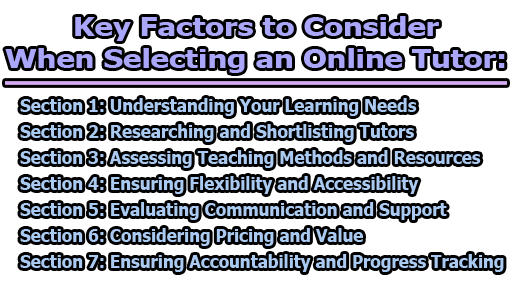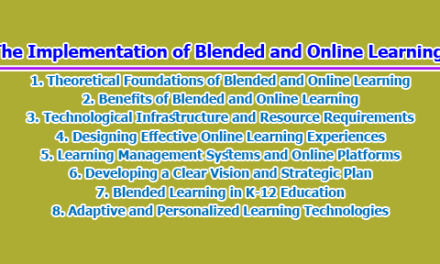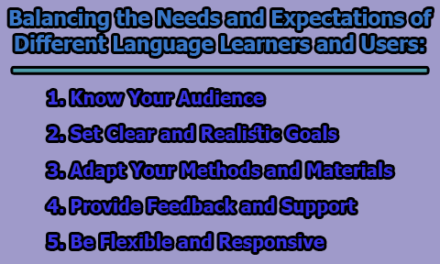Key Factors to Consider When Selecting an Online Tutor:
In the fast-evolving landscape of education, online tutoring has become increasingly popular as a flexible and accessible option for learners of all ages. Whether you’re seeking support for academic subjects, language learning, test preparation, or skill development, choosing the right online tutor is crucial for achieving optimal learning success. In this guide, we will explore the key factors to consider when selecting an online tutor, ensuring a personalized and effective learning experience for you or your child.
Section 1: Understanding Your Learning Needs:
1.1 Identifying Specific Learning Goals: Before delving into the vast pool of online tutors, it’s crucial to identify your specific learning goals. Whether you’re aiming to improve academic performance, prepare for standardized tests, or acquire a new skill, clarifying your objectives will help you narrow down your search and find a tutor with expertise in your desired area.
1.2 Assessing Learning Styles: Understanding your preferred learning style is essential for finding a tutor whose teaching methods align with your needs. Whether you are an auditory, visual, or kinesthetic learner, matching your learning style with the tutor’s teaching approach enhances the effectiveness of the learning process.
Section 2: Researching and Shortlisting Tutors:
2.1 Researching Platforms and Services: There is a multitude of online tutoring platforms and services available, each offering a variety of tutors and subjects. Research different platforms, considering factors such as reputation, user reviews, and the range of subjects offered. Popular platforms include Tutor.com, Chegg Tutors, and Wyzant.
2.2 Reading Reviews and Testimonials: User reviews and testimonials provide valuable insights into the effectiveness of an online tutor. Look for reviews on both the tutoring platform and independent review sites to gain a comprehensive understanding of the tutor’s strengths and weaknesses.
2.3 Checking Qualifications and Expertise: Verify the tutor’s qualifications and expertise in the subject or skill you are looking to learn. Many platforms display tutor profiles with details about their education, experience, and areas of specialization. Choose a tutor whose credentials align with your learning goals.
Section 3: Assessing Teaching Methods and Resources:
3.1 Customization and Personalization: An effective online tutor should be able to tailor their teaching methods to suit your individual needs. Look for tutors who offer personalized lesson plans, adaptive teaching strategies, and the flexibility to address your specific challenges and strengths.
3.2 Interactive and Engaging Sessions: Engagement is crucial for effective learning. Seek tutors who incorporate interactive elements, such as multimedia resources, real-world examples, and interactive exercises, to make the learning experience enjoyable and memorable.
3.3 Technological Competence: Ensure that the online tutor is proficient in using the necessary technology and platforms for virtual learning. This includes familiarity with video conferencing tools, online whiteboards, and other collaborative resources that enhance the online tutoring experience.
Section 4: Ensuring Flexibility and Accessibility:
4.1 Scheduling Options: Flexibility in scheduling is a key consideration, especially for learners with busy schedules. Choose a tutor who offers a range of flexible time slots and is willing to accommodate your preferred study times.
4.2 Accessibility and Connectivity: Verify that both you and the tutor have access to reliable internet connections and compatible devices. A stable connection is crucial for smooth online sessions, and compatible devices ensure that you can fully utilize the online learning platform.
Section 5: Evaluating Communication and Support:
5.1 Clear Communication Channels: Effective communication is vital for a successful online tutoring relationship. Choose a tutor who establishes clear communication channels, promptly responds to messages, and provides updates on progress and performance.
5.2 Availability for Questions and Clarifications: A good online tutor should be accessible for questions and clarifications outside of scheduled sessions. Consider tutors who offer additional support through messaging or email, ensuring that you can seek assistance when needed.
Section 6: Considering Pricing and Value:
6.1 Comparing Pricing Models: Different online tutoring platforms and individual tutors may have varying pricing models. Some charge per session, while others offer subscription packages. Compare the pricing structures to find a tutor that aligns with your budget and offers good value for the services provided.
6.2 Seeking Free Trials or Demo Sessions: Many online tutors and platforms offer free trials or demo sessions. Take advantage of these opportunities to assess the tutor’s teaching style, compatibility with your learning preferences, and overall effectiveness before committing to a paid arrangement.
Section 7: Ensuring Accountability and Progress Tracking:
7.1 Goal Setting and Progress Tracking: Establish clear learning objectives with your online tutor and discuss how progress will be measured. Tutors who set achievable goals and provide regular feedback contribute significantly to a structured and effective learning experience.
7.2 Assessing Accountability Measures: Check if the tutor has a system in place for tracking attendance, completed assignments, and overall progress. This accountability ensures that both parties are committed to the learning journey and can make adjustments as needed.
In conclusion, choosing the best online tutor requires careful consideration of various factors, from understanding your learning needs and preferences to assessing the tutor’s qualifications, teaching methods, and support systems. By following this comprehensive guide, you can make an informed decision that maximizes your chances of success in achieving your educational and personal development goals through online tutoring. Remember that finding the right tutor is a dynamic process, and periodic reassessment can lead to ongoing learning success.
Frequently Asked Questions (FAQs):
How do I identify my specific learning goals when searching for an online tutor?
Start by assessing areas where you need improvement or want to acquire new skills. Consider your academic or career objectives and any challenges you may be facing in specific subjects. This self-reflection will help you define clear learning goals.
What factors should I consider when researching online tutoring platforms?
Look for platforms with a good reputation, positive user reviews, and a diverse range of subjects. Consider factors such as pricing, ease of use, and available features. Popular platforms include Tutor.com, Chegg Tutors, and Wyzant.
How important are user reviews when choosing an online tutor?
User reviews provide valuable insights into the tutor’s teaching style, communication skills, and overall effectiveness. They can offer a firsthand perspective on the tutor’s strengths and weaknesses, helping you make an informed decision.
What qualifications should I look for in an online tutor?
Check for relevant academic qualifications, professional experience, and expertise in the subject or skill you want to learn. Many online tutoring platforms provide detailed tutor profiles that include this information.
How can I determine if an online tutor’s teaching methods align with my learning style?
Communicate with potential tutors and inquire about their teaching approach. Some may offer trial sessions or provide detailed information about their methods on their profiles. Understanding your learning style and preferences will also guide you in finding a compatible tutor.
Are there any red flags to watch out for when selecting an online tutor?
Be cautious if a tutor lacks relevant qualifications, has consistently negative reviews, or doesn’t communicate clearly. Additionally, if there are issues with scheduling, accessibility, or accountability, these may indicate potential challenges in the tutoring relationship.
How can I assess an online tutor’s technological competence?
Inquire about the platforms and tools the tutor uses for online sessions. Ensure that they are comfortable with video conferencing tools, online whiteboards, and any other resources necessary for effective virtual learning.
What role does flexibility play in choosing the right online tutor?
Flexibility in scheduling is crucial, especially if you have a busy routine. Look for tutors who offer a range of time slots to accommodate your availability and are willing to adjust schedules when needed.
How can I ensure effective communication with my online tutor?
Choose a tutor who establishes clear communication channels, responds promptly to messages, and provides updates on progress. Clear communication is essential for addressing questions, concerns, and ensuring a smooth learning experience.
Should I prioritize pricing or quality when selecting an online tutor?
It’s important to strike a balance between pricing and quality. While budget considerations are valid, prioritize tutors who offer good value for their services. Look for platforms or tutors that provide a balance between affordability and effective teaching.
How do I track my progress with an online tutor?
Work with your tutor to set clear learning objectives and discuss how progress will be measured. Regular assessments, feedback sessions, and goal-setting help track your development and make adjustments to the learning plan as needed.
What should I do if I’m not satisfied with my online tutor?
Communicate openly with your tutor about any concerns or issues. If the problems persist, consider exploring other tutoring options. Many platforms offer the flexibility to switch tutors or request a refund if the learning experience is not meeting your expectations.

Library Lecturer at Nurul Amin Degree College










